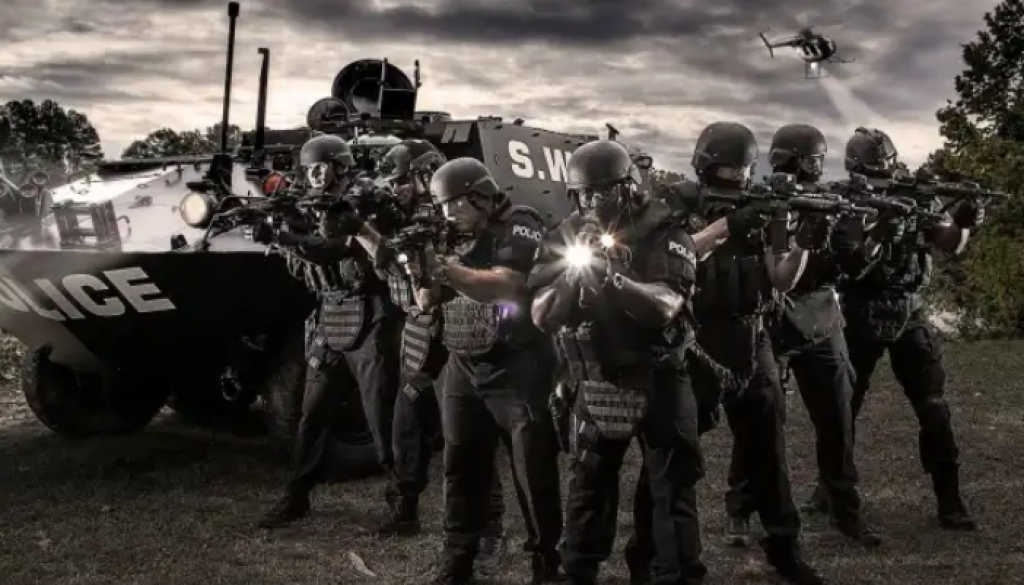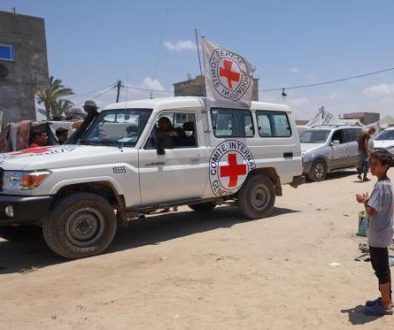‘Deadly Exchange’: How US Police Learn Their ‘Worst Practices’ From The IDF
Through police exchange programs, local and federal officials travel to Israel for training that advocates say further militarizes the police and exacerbates harm to marginalized communities.
(The Real News Network) It is not uncommon for police to drive around with their lights flashing in Black and working-class neighborhoods in Atlanta. This is a tactic used to intimidate and make their presence known; for residents of these neighborhoods, it can feel like psychological warfare. US law enforcement learned this strategy from Israeli forces.
Thousands of law enforcement officials have traveled to Israel to learn new repression strategies and surveillance techniques from the Israel National Police, Israel Defense Forces, and the Shin Bet, who inflict violence, crowd control, and surveillance onto Palestinians. Anti-imperialist advocates say the tactics being taught to US law enforcement were battle-tested on Palestinians and spread to the US to target Black and Brown communities through a training relationship that grants Israeli forces more power and profit, causing further harm to Palestinians.
These programs are facilitated by the Anti-Defamation League, the Jewish Institute for National Security of America, and the Georgia International Law Enforcement Exchange Program—the latter of which was started in 1996. US leaders sought Israel’s guidance to curb terrorism, and a ‘deadly exchange’ of worst practices between US and Israeli forces was born. Federal, state, county, and municipal law enforcement executives including local police departments, the FBI, and ICE have traveled to Israel, while thousands of officials have attended conferences with Israeli experts in the US. An inaugural “US-Israel Security Conference” by JINSA occurred last month, where a former Israel Defense Forces commander was included as a guest speaker.
“Within these programs, worst practices are shared to promote and extend discriminatory and repressive policing practices that already exist in both countries,” said Rania Salem, an organizer with the US Palestinian Community Network. “US forces take whatever is working in Israel and they bring it here and inflict it on Black and Brown people.”
Police departments in New York, Los Angeles, New Orleans, and Atlanta, among others, have close ties with Israeli forces. Salem said that the increasing militarization of US police in recent decades is due in large part to the “funding and support of Israel’s brutal military occupation.” She said that in return for these trainings the state of Israel gets in good standing with the US for future support, and its forces learn new tactics in return—Salem said that Israel learned stop-and-frisk and racist traffic stop techniques from US law enforcement.
There is strong opposition. Palestinian solidarity, racial justice, and local organizations are calling for an end to this deadly exchange, saying that it perpetuates settler colonialism and violence against marginalized communities, and harms both people in the US and in Palestine. They say that investments should be made into the community, not policing.
“It essentially brings together all these violent systems that oppress our people here in the United States and oppress Palestinians and Palestine together,” Salem said. “Our communities need to come together to organize against these police exchange programs.”
The Deadly Exchange
After George Floyd was murdered by Minneapolis Police Officer Derek Chauvin in 2020, advocates said that the knee-to-neck choke-hold used was “used and perfected to torture Palestinians by Israeli occupation forces through 72 years of ethnic cleansing and dispossession.” Members of the Minneapolis Police Department have been trained by Israeli officials.
Following that, when thousands of protestors took to the streets in the Black Lives Matter uprisings, police used racial profiling, tear gas, and other repressive crowd control techniques to quell the protestors. Salem said many of those practices were exported from the violence of Israeli forces.
“When police started using different kinds of weaponry against protesters, Palestinians were already very, very familiar with that kind of confrontation,” Salem said.
Between 2002 to 2009, the Los Angeles Police Department’s chief and deputy chief traveled to Israel for training multiple times. The deputy chief traveled as part of JINSA’s first cohort in their first law enforcement exchange program. During these trips, Israeli companies introduced the LAPD officials to facial recognition and drone technology manufactured in Israel. The police department also developed a “broken windows” approach, which “grows from the idea that constant policing of low-level disorder—through the targeting of Black and brown communities with constant police surveillance, harassment—will somehow deter serious criminal activity.”
After nearly 10 years of training with Israeli forces, the New York Police Department was exposed to have run a “demographics unit” that spied on Muslims and “treated basic acts of daily living as potential crimes,” which are techniques used by Israeli forces on Palestinians. In return, they adopted NYPD’s data collection method.
“Certain police practices and policies that all happen time and time again, when you look back and try to pull back on the thread to see where they got this from, it always comes back to somebody went to Israel,” said Steven H., an organizer with the Black Alliance for Peace.
Officials in Atlanta, Georgia, are pioneers in the police exchange program as well. The Georgia International Law Enforcement Exchange Program, housed at the University of Georgia, has been sending people to Israel every year for over 31 years. Steven H. said that the trips are funded by private entities, Department of Justice grants, and taxpayer dollars.
Steven H. also said that the GILEE program also trains with Israeli forces through annual conferences in Atlanta and hosts law enforcement from around the country at these events. The training, he said, includes workshops and seminars.
Musa Springer, also an organizer with Black Alliance for Peace, said that at least 43,000 people have participated in GILEE workshops, conferences, and events. They said it creates danger for Atlantans, as demonstrated in the police killings of Anthony Hill and several Black people in Atlanta.
“There is a sort of level of racial profiling that is sewn into the tactics and then those racial profiling, which also takes place here in the US, among us, becomes even stronger and more reinforced in the style of policing,” Springer said. “What we see is that Black residents, as well as activists and organizers who are mobilizing, are increasingly treated as terrorists.”
Out of Atlanta’s collaboration with Israeli forces comes their “Cop City” police training facility, which is based off Israel’s “Little Gaza,” a replica of the Gaza strip. At these facilities, police can battle test repressive techniques and surveillance. Steven H. said that the Cop City and Little Gaza are meant “to give the occupying forces a realistic training ground in which they can actually implement their counterinsurgency tactics on the occupied population.”
“Anybody who goes there will be participating in the skills development of counterinsurgency, of how to better practice kettling, how to better practice shutting down or brutalizing peaceful protests,” Steven H. said.
Surveillance and Technology Expansions
In addition to repressive tactics, advocates say that US and Israeli forces both make use of surveillance techniques and technology that is Israel-based, like Cellebrite, and predictive policing software, like the software provided by Palantir.
Lou Blumberg, co-founder of Eye on Surveillance and a representative of the Jewish Voice for Peace chapter in New Orleans, said that, in 2014, the Baton Rouge Police Department took a trip to Tel Aviv which was funded by a government grant, the Jewish Federation, and other private entities. The goal was to learn about Cellebrite, a ‘universal forensics extraction device’ from an Israel-based technology company, in order to bring the surveillance back to the US. Cellebrite’s technology was tested on Palestinians before its usage became widespread.
“Because Israel is occupying the Palestinian people, it creates what author Antony Lowenstein calls the ‘Palestine Laboratory’ for Israel to experiment and then get all this data about these surveillance tools, and then be able to sell that … ‘Look how well these tools are working to criminalize these people, don’t you want that for your country?’” Blumberg said.
An organizer with New Orleans Stop Helping Israel’s Ports, an organization dedicated to ending all ties between New Orleans institutions and businesses and Israel, who wished to remain anonymous, said that a lot of the cameras the city of New Orleans has put up in the streets for surveillance use Israeli technology. She said that law enforcement can often use Briefcam, an Israeli video surveillance technology, now owned by the parent company Canon.
Hundreds of people in the US have been arrested due to facial recognition technology, some of them falsely identified. People of color, particularly Black people, are more likely to be misidentified by facial recognition technology.
The organizer said that Israeli technology companies are “taking this technology and exporting it for governments like the US government to perpetuate this form of apartheid that marginalized communities have been living under” and Israel “uses the same tactics abroad and over here in order to further their hegemony and their occupation of the people.”
“Cellebrite is used today to violate people’s right to due process, or these AI facial recognition technologies are used to attack and jail people, mostly disproportionately people of marginalized communities,” the organizer told TRNN. “These have been tried and tested methods in Palestine for the past decades, and Israel does it to expand its territory, to further occupy and oppress people to further the apartheid system that they are under.”
In addition to supplying local law enforcement with surveillance, the organizer said that Israeli companies sell Cellebrite “universal forensics extraction” hacking software and training to ICE, which gives them access to personal data. ICE officials have gone on multiple trips to Israel to swap “best practices” at checkpoints, prisons, settlements, and the airports in Israel.
The US Department of Homeland Security has also been contracting with Israeli defense electronics company Elbit Systems for technology that surveils the US-Mexico border in southern Arizona since 2014. The contract was extended by DHS in 2017 to further militarize the border using this technology.
Edith Romero, an organizer with Eye on Surveillance, said she sees parallels in the rhetoric Prime Minister Benjamin Netanyahu and Israeli forces use for Palestinians and the language used in the US to talk about immigrants. In the past, President-elect Donald Trump and Netanyahu have praised each other’s border policies.
“They’re using this to target immigrant communities and to arrest, to detain and to separate families, and sometimes deportations,” Romero said.
The Fight to Stop The Exchange
Activists are fighting for liberation in the US and Palestine. Some are already seeing victories. In 2020, Eye on Surveillance successfully advocated for a ban on facial recognition surveillance—provided in large part by Israeli companies—in New Orleans. While parts of the ban were reversed in 2022, the organization continues to hold monthly meetings to push back against surveillance and policing.
Additionally, they are looking to end economic ties between Israel and the city permanently and calling for the money to be redirected into the community. Renard Bridgewater, co-founder of Eye on Surveillance, said that “so many things could be funded with the money that is going towards Israel and their continued onslaught and overall abuse and slaughter of Palestinian people.”
Bridgewater said that rather than funding law enforcement trips to Israel, cities should be supporting their residents by providing equitable living wages, education, affordable housing, and resources to solve food insecurity. Eye on Surveillance is also part of the Break the Bonds Campaign in Louisiana, which aims to encourage state officials to divest from Israel. The state has over $40 million in bonds which the organization said “bolsters and supports Israel’s economy.”
Bridgewater said that people can fight against the police training exchanges and Israeli technology being used in the US by organizing. Eye on Surveillance, Black Alliance for Peace, and the US Palestinian Community Network are some of many organizations raising awareness about the issue.
“I think that small movements or small ripples certainly create larger movements and things of that nature,” Bridgewater said. “I think that any time you have the opportunity to be able to build with folks, no matter if it’s two or three, that can eventually lead to two or 3,000 but it has to start somewhere, and it can’t necessarily always be these very grandiose and large, expansive ideas.”
“It’s important to get together and organize, because as soon as we realize that our enemies are the same, the easier it is to realize who our allies are,” said the organizer with NOSHIP. “Once we organize and put these two and two together, then we know who put our effort against.”





